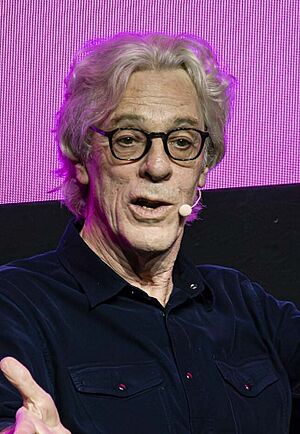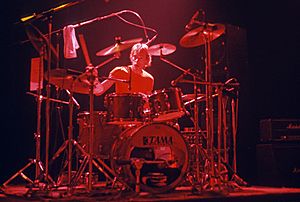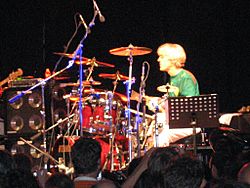Stewart Copeland facts for kids
Quick facts for kids
Stewart Copeland
|
|
|---|---|

Copeland in 2025
|
|
| Background information | |
| Birth name | Stewart Armstrong Copeland |
| Also known as | Klark Kent |
| Born | July 16, 1952 Alexandria, Virginia, U.S. |
| Genres | |
| Occupation(s) |
|
| Instruments |
|
| Years active | 1974–present |
| YouTube information | |
| Genre | Music |
| Subscribers | 104 thousand |
| Total views | 14.2 million |
| Subscriber and view counts updated as of February 13, 2025. | |
Stewart Armstrong Copeland was born on July 16, 1952. He is an American musician and composer. He is most famous as the drummer for the British rock band The Police. He played with them from 1977 to 1986, and then again from 2007 to 2008.
Before joining The Police, Stewart was the drummer for the English rock band Curved Air from 1975 to 1976. As a composer, he has created music for many films, TV shows, and video games. Some of his film scores include Wall Street, Good Burger, and We Are Your Friends. He also wrote theme music for TV shows like The Equalizer and The Amanda Show.
Stewart Copeland also composed music for video games, especially the Spyro series. He has written music for ballet, opera, and orchestras too. Many people in the music world think he is one of the best drummers ever. Rolling Stone magazine ranked him as the 10th best drummer of all time in 2016. He was inducted into the Rock and Roll Hall of Fame with The Police in 2003.
Contents
Stewart's Early Life
Stewart Copeland was born in Alexandria, Virginia, on July 16, 1952. He was the youngest of four children. His mother, Lorraine Copeland, was a Scottish archaeologist. His father, Miles Copeland Jr., was an American diplomat.
Stewart's family moved to Cairo when he was a baby because of his father's work. When he was five, they moved to Beirut. There, he went to the American Community School. He started drum lessons at age 12 and was playing for school dances within a year.
Later, he moved to England and attended the American School in London. He also went to Millfield boarding school. He then studied at colleges in California. His older brother, Miles Copeland III, started I.R.S. Records and became The Police's manager. Another brother, Ian Copeland, was a well-known booking agent for many bands, including The Police.
Stewart's Music Career
Playing with Curved Air (1975–1976)
After college, Stewart returned to England. He first worked as a road manager for the band Curved Air. Then, he became their drummer in 1975 and 1976. The band became very popular for their live shows.
Eventually, Curved Air broke up. Stewart then formed The Police. The singer of Curved Air, Sonja Kristina, and Stewart stayed close. They later married in 1982.
The Police Years (1977–1986)
In early 1977, Stewart started The Police. He formed it with lead singer and bassist Sting and guitarist Henry Padovani. Soon, Andy Summers replaced Henry. The band quickly became one of the biggest groups of the late 1970s and early 1980s. Stewart was the youngest member.
Many of The Police's early songs were written by Stewart. This included their first single, "Fall Out". Even when Sting started writing more songs, Stewart helped arrange all of The Police's music with his bandmates. Some of Stewart's famous songs include "On Any Other Day" (where he also sang) and "Does Everyone Stare". He also co-wrote songs with Sting, like "Peanuts".
Stewart also released music under the name Klark Kent. He played all the instruments and sang on these songs himself. One of his songs, "Don't Care", even entered the UK music charts in 1978.
In 1982, Stewart helped create a benefit album called Music and Rhythm. In 1983, he received a Golden Globe nomination for his music score for the film Rumble Fish. He also released an album called The Rhythmatist in 1985. This album was inspired by a trip to Africa and featured many local drums. The Police tried to reunite in 1986, but it did not work out at that time.
Solo Work and Movie Music (1987–1998)
After The Police broke up, Stewart became a successful composer for films and TV. He wrote music for movies like Wall Street and Good Burger. He also composed for TV shows such as The Equalizer and The Amanda Show.
Stewart also wrote music for operas and ballets. In 1996, he scored The Leopard Son, a documentary film about wildlife. He sometimes played drums for other artists too. He played on Peter Gabriel's song "Red Rain" and with Mike Rutherford. In 1989, Stewart formed a band called Animal Logic with bassist Stanley Clarke and singer Deborah Holland. They released an album and toured, but later went their separate ways.
Spyro the Dragon Games (1998–2002, 2018)
In 1998, Stewart was asked to create the music for the popular PlayStation game Spyro the Dragon. He would play through the game levels first to get ideas for the music. He also composed for the next two Spyro games, Spyro 2: Ripto's Rage! and Spyro: Year of the Dragon. His last Spyro game was Spyro: Enter the Dragonfly. The music for these games was very popular. In 2018, he composed a new main theme for Spyro Reignited Trilogy, which was a remastered collection of the original games.
During this time, Stewart also wrote music for the video game Alone in the Dark: The New Nightmare. In 2000, he formed a band called Oysterhead with Les Claypool and Trey Anastasio.
Collaborations and Projects (2002–2006)
In 2002, Stewart worked with Ray Manzarek and Robby Krieger from The Doors for an album and tour. In 2005, he released "Orchestralli", which was a live recording of music he had composed. Also in 2005, Stewart started a new project called Gizmodrome.
In 2006, Stewart premiered his film about The Police called Everyone Stares: The Police Inside Out at the Sundance Film Festival. He also appeared as a judge on the BBC TV show Just the Two of Us.
The Police Reunion (2007–2008)
At the 2007 Grammy Awards, Stewart, Andy Summers, and Sting performed "Roxanne" together as The Police. This was their first public performance since 2003. The next day, they announced a reunion tour to celebrate the band's 30th anniversary. The tour began on May 28, 2007. During the tour, Stewart also released a collection of his independent work called The Stewart Copeland Anthology.
The band performed 151 shows around the world. The tour ended in August 2008 at Madison Square Garden in New York.
Recent Projects (Since 2008)
In 2008, Stewart created a "soundtrack" for the BlackBerry Bold smartphone, including ringtones. He also premiered his orchestral music piece "Celeste" at a music festival. In 2009, he wrote the music for a live show of Ben-Hur in London.
Stewart's book, Strange Things Happen: A Life with The Police, Polo, and Pygmies, was released in September 2009. It tells stories from his childhood, his time with The Police, and his life since then.
In 2011, he started a YouTube channel where he shares videos of himself playing with other musicians in his home studio, which he calls the Sacred Grove. In 2013, he and the Long Beach Opera presented The Tale Tell Heart, an opera based on a story by Edgar Allan Poe.
In 2017, he formed the supergroup Gizmodrome with Adrian Belew, Vittorio Cosma, and Mark King. They released an album that was popular in the UK.
Stewart collaborated with Ricky Kej on an album called Divine Tides. This album was released in 2021 and won Stewart his sixth Grammy Award in April 2022. In February 2023, Divine Tides won Stewart his seventh Grammy Award for Best Immersive Audio Album.
Stewart's Personal Life
Stewart Copeland was married to Curved Air singer Sonja Kristina from 1982 to 1991. He adopted her son, and they had two sons together. He also has another son from a different relationship. Stewart now lives in Los Angeles with his second wife, Fiona, and their three children.
Stewart enjoys rollerskating, cycling, making films, and playing polo. He is also very active on his YouTube channel, sharing videos of music sessions.
Stewart's Drumming Style
Stewart grew up listening to many types of music, including Lebanese music, rock, jazz, and reggae. He took parts from these styles to create his own unique sound. He used special drums called Octobans and a unique splash cymbal that he helped design. He also used his 13-inch hi-hats a lot.
Even though he is left-handed, Stewart plays a right-handed drum kit. This means his hi-hats are on his left side, and his ride cymbal and floor toms are on his right. He is known for his wide range of sounds and his jazz-like drumming on the snare drum. When he played with The Police, he often used only the hi-hat with the bass drum to keep the beat.
Stewart has mentioned that some of his favorite drummers are Mitch Mitchell from The Jimi Hendrix Experience, John Bonham, Buddy Rich, Ringo Starr, and Ginger Baker.
Images for kids
See also
 In Spanish: Stewart Copeland para niños
In Spanish: Stewart Copeland para niños
 | William L. Dawson |
 | W. E. B. Du Bois |
 | Harry Belafonte |




